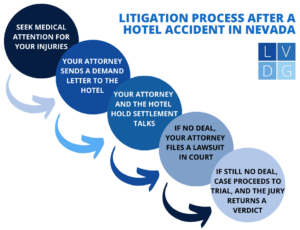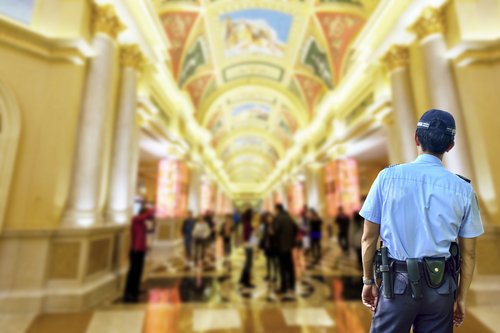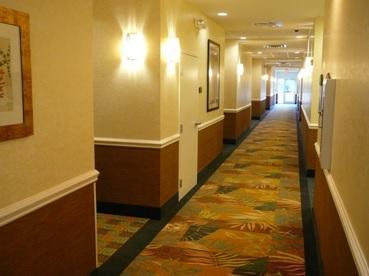Hotels in Nevada have a legal duty:
- to make their properties reasonably safe for visitors, and
- to warn of dangers that may not be open and obvious.
If you were injured by an unsafe condition at a hotel or resort, you can sue for medical bills, lost wages, and pain and suffering.
It is common for Las Vegas hotel patrons to get hurt from
- slip-and-falls,
- food poisoning,
- swimming pool accidents, and even
- burns from hot shower water.
In many cases, the hotel’s negligence is to blame.

1. How do I prove a hotel negligence claim in Las Vegas?
To win a negligence claim against a hotel after you had an accident, you must prove four things:
- The hotel had a duty of care towards you;
- The hotel breached that duty;
- The breach caused your injuries; and
- Your injuries resulted in damages.1
To prove these elements, first seek medical attention right after your accident, and never miss a follow-up doctor’s appointment. Even if you feel okay, you may have a serious injury that does not show up until later. Medical records can be vital evidence in your case.
If possible, take photos and videos of the accident scene and your injuries. Get the contact information of any eyewitnesses, and preserve all the other evidence you can. For example if you had a fall, save a sample of the substance you slipped on.
Then, write down everything that happened. Memories fade quickly, and even small details could make a big difference in determining fault.
Finally, contact a Nevada personal injury attorney to take the case from there. Your attorney can try to:
- obtain surveillance video of the incident, and
- subpoena maintenance and repair records that show the hotel has been negligent in keeping the property up to code.
Eventually your attorney may be able to negotiate a generous settlement.
2. What if I was partly to blame?
Even if you were partly at fault for your hotel/casino injury such as by:
- not paying attention to your surroundings,
- being intoxicated, or
- wearing inappropriate footwear prone to tripping,
you can still win a personal injury claim if the hotel was at least 50% to blame. Nevada’s comparative negligence laws do not demand that you be a perfect victim to recover money damages; rather, you just cannot be more than half at fault.2

Hotels’ duty of care includes having adequate security on-site.
3. Who can I sue?
The main defendant in your hotel injury case (such as a slip and fall) will likely be the hotel itself. Due to premises liability, the hotel is responsible for:
- keeping the grounds reasonably safe, and
- warning against any reasonably foreseeable hazards.
Even if you were injured by a hotel employee (such as a waiter who spilled a hot drink on you), the hotel would still be responsible due to respondeat superior (“vicarious liability”). You may also be able to sue the hotel for negligent hiring if the hotel failed to find red flags in the employee’s background check.3
You may be able to sue additional parties that also have deep pockets and large insurance company policies, as this chart shows:
| Hotel Accidents |
Potential Defendants |
| Slip-and-fall |
|
| Food poisoning |
|
| Trampling from poor crowd control |
|
| Defective elevator |
|
4. How soon do I have to sue?
In general, Nevada’s statute of limitations to bring a negligence lawsuit in a hotel injury case is two (2) years after you discover your injury.4
You are advised to consult with an attorney as soon as possible. The longer you wait, the less of a chance that your legal team will be able to find surveillance video and eyewitnesses with sharp memories. Evidence tends to fade with time.

Nevada hotels are required to maintain their floors to keep them safe.
5. How much money can I get?
Your personal injury attorney’s goal is to reach a settlement with the hotel’s commercial insurance company that covers all your past and future compensatory expenses. These include “economic damages” such as:
- medical bills: hospital stays, home health care, doctor’s appointments, rehab, mental health counseling, medication, and other medical treatment.
- lost wages: any salary, tips, bonuses, and promotions you lost out on because of the injury.
- loss of future earnings: any salary, tips, bonuses, and promotions you will lose out on because of the injury.
Your attorney would also seek “non-economic damages” such as
- pain and suffering from the impact of the injury,
- mental anguish, and
- loss of enjoyment of life.
Some of the higher payouts occur in cases where victims sustain traumatic brain injuries, spine injuries, or other conditions that deplete their quality of life and prevent them from working. The biggest settlements are paid in wrongful death cases brought by the victim’s estate and family members.
If your case proceeds to a trial (which is rare), your attorney can ask for punitive damages to punish the defendants for their reckless or malicious behavior. Punitive damages can be as much as three (3) times your compensatory damages. (If your compensatory damages amount to less than $100,000, then the cap would be $300,000.)5
6. What are common hotel accidents?
Slip and falls are probably the most common accident to occur in Nevada hotels. The causes include either:
- wet surfaces
- torn carpeting or loose carpets
- broken or defective stairs or handrails
- cracked tiles and uneven floors
- uneven pavement, especially in parking lots and walkways
- broken, unstable furniture, such as collapsing chairs at restaurants, arenas, gaming tables, bars, or in hotel rooms
- broken escalators
Other common hotel mishaps are outlined in this chart:
| Hotel Accidents |
Hotel Breach of Duty |
| Food poisoning |
|
| Pool or drowning accidents |
|
| Elevator accidents |
|
| Rape, theft, or assault |
|
| Burns |
|
| Hotel shuttle bus accidents |
|
Bed bugs are also an increasing problem in hotels and motels due to unhygienic hotel rooms and bedsheets.

Nevada hotels can still be liable for injuries that occur on its premises if the hotel was only 50% at fault.
7. What if I signed a liability waiver?
Nevada hotels typically make patrons sign a liability waiver prior to certain risky activities (such as riding a roller coaster). In these contracts, you:
- agree to assume the risk of the activity and
- promise not to sue the hotel should you get injured.
Although liability waivers are valid, they protect hotels only from negligence claims. This means you can still sue for gross negligence.
Gross negligence is more than mere carelessness: It is a reckless disregard for your safety. (An example would be failing to have working safety belts on a roller coaster.)
Therefore if a hotel’s gross negligence caused your injuries, you can sue whether or not you signed a liability waiver.6
8. What if my property was damaged?
Nevada hotels are usually immune from liability for any property you bring on the premises that gets:
- damaged,
- lost, or
- destroyed.
As long as your hotel room has a safe – and your property can fit into the safe – the hotel is not responsible for it. If you have property that cannot fit into your room safe – and it gets damaged or lost – the hotel is liable for up to $750.7
Additional Resources
For more in-depth information, refer to these scholarly articles:
- Reducing the Slipperiness of Slip and Fall Litigation: Establishing Strict Liability for Hotels – Santa Clara Law Review.
- Collapsing Chairs: A Source of Liability – Cornell Hospitality Quarterly.
- Torts–Negligence–Negligence Per Se as Proximate Cause of Injury in “Fall-Down” Cases – Kentucky Law Journal.
- Innkeeper Liability for Criminal Acts of Third Parties: Should Negligence of the Franchisee Extend to the Franchisor – Memorial State University Law Review.
- Preventing accidents: Hotel liability – Hotel Management.
Legal References
- Turner v. Mandalay Sports Entm’t, LLC, (2008) 124 Nev. 213, 180 P.3d 1172.
- NRS 41.141. Humphries v. New York, New York, (2017) 133 Nev. Advance Opinion 77. Associated Press, Jury awards $524K in lawsuit after Mandalay Bay offered $2.5M, Las Vegas Review-Journal (November 20, 2018). Nevada Jury Instructions 4.03.
- Hammerstein v. Jean Dev. West, (1995) 111 Nev. 1471, 907 P.2d 975 (In premises liability claims, hotels owe a higher duty of care to their guests (called “invitees”) than it does to trespassers. Trespassers who get injured at a hotel will have a more difficult time proving that the hotel is liable than injured guests would); Nevada Transfer and Warehouse Co. v. Peterson (1939) 60 Nev. 87, 89 P.2d 8; Wright v. Watkins and Shepard Trucking, Inc. (D. Nev. 2012) 972 F.Supp.2d 1218; NRS 41.515.
- NRS 11.190.
- Nev. Rev. Stat. 42.005.
- Nev. J.I. 6.21.
- NRS 651.010.

